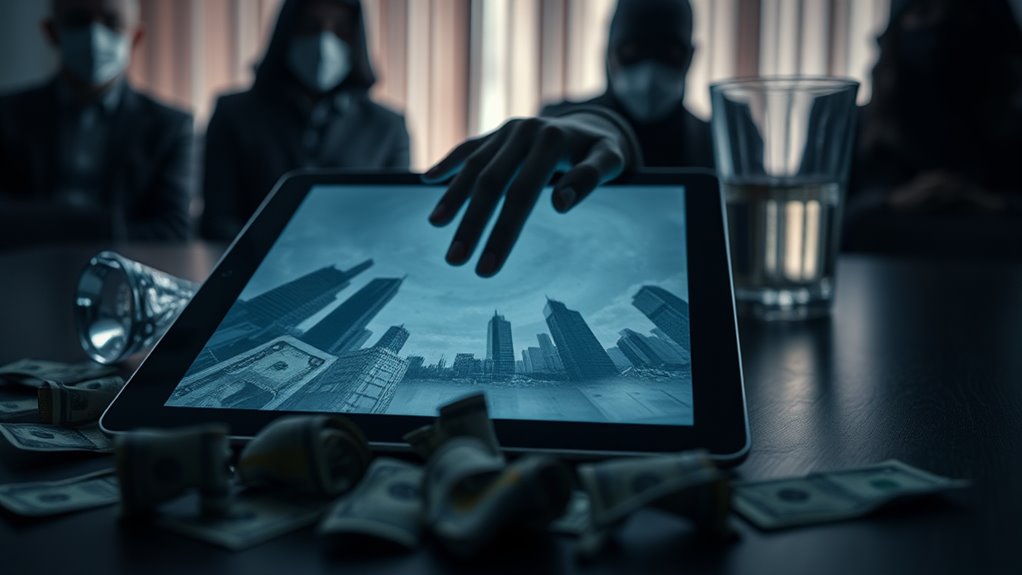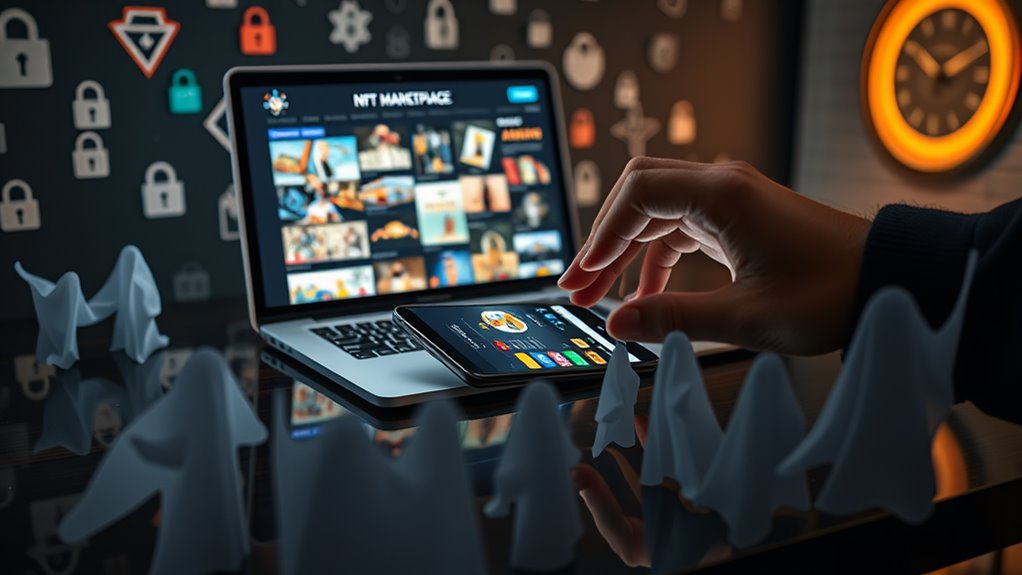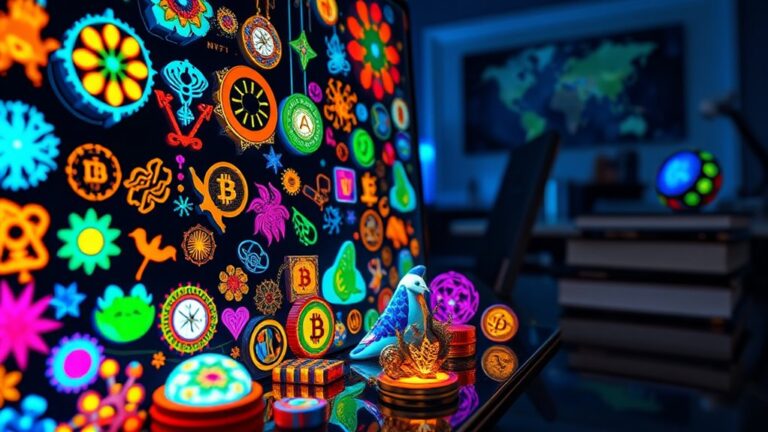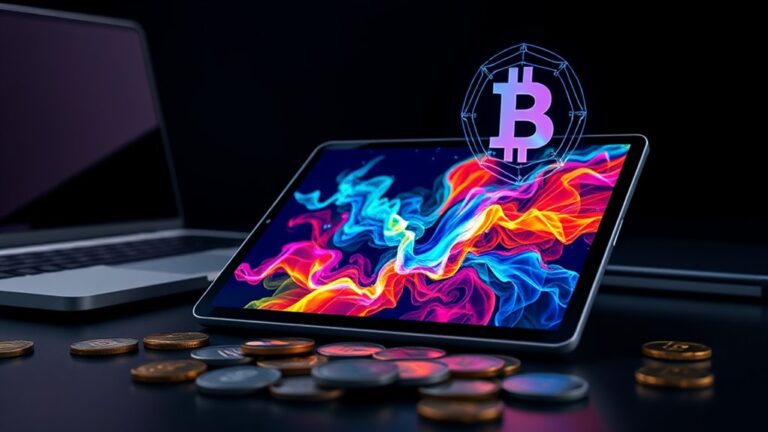
Risks and Scams in NFTs: What to Know and How to Stay Safe?
The NFT market presents various risks, including common scams that can result in financial loss. Buyers should be aware of fake NFTs, marketplace impersonation, and rug pulls, which leave investors with worthless assets. Phishing attacks are also prevalent, tricking users into revealing wallet information. Regulatory concerns arise as frameworks develop to combat fraud, highlighting the need for cybersecurity measures like two-factor authentication and strong passwords. Understanding these risks is essential for safe investment in the NFT space, and there is more to explore on this topic.
Key Takeaways
- Be cautious of fake NFTs and verify ownership and authenticity before making any purchases.
- Protect yourself from phishing attacks by using two-factor authentication and avoiding suspicious links.
- Beware of rug pulls; research projects thoroughly and only invest in established, reputable creators.
- Use reputable digital wallets with cold storage to safeguard your assets from malware and identity theft.
- Report any fraudulent activity to platforms and utilize blockchain tools to track scams and recover lost assets.
Common NFT Scams to Watch Out For

What are the most common NFT scams that individuals should be aware of?
NFTs, or non-fungible tokens, can be susceptible to various scams. One prevalent scam involves fake NFTs, where counterfeit tokens misrepresent ownership or authenticity.
NFTs are vulnerable to scams, including fake tokens that falsely claim ownership or authenticity.
Another serious concern is marketplace impersonation, where scammers imitate legitimate NFT platforms to deceive buyers.
Rug pulls are also common; these occur when projects vanish after raising funds, leaving investors with worthless assets.
Phishing attacks are used to steal credentials through fake emails or links.
Additionally, NFT airdrops can pose risks, as scammers may use free giveaways to gain access to wallets.
Being informed about these scams can help individuals make safer choices in the NFT market and protect their investments. Furthermore, understanding how blockchain technology ensures authenticity and scarcity can help buyers discern legitimate NFTs from fraudulent ones.
Techniques Used in NFT Fraud

As the popularity of NFTs continues to rise, various techniques used in NFT fraud have emerged, posing significant risks to unsuspecting buyers.
Phishing attacks often trick users into revealing sensitive wallet information. Scammers also create counterfeit NFTs, selling them as genuine pieces of digital art.
Another method involves pump and dump schemes, where prices are artificially inflated before fraudsters sell at a profit. Identity theft is common, with fraudsters impersonating artists to sell fake NFTs.
Additionally, malware can be spread through deceptive links, compromising wallet security. Other tactics include rug pulls, bidding scams, and fake giveaways, all designed to exploit unsuspecting investors. Understanding these techniques is essential for protecting oneself in the evolving NFT landscape. Furthermore, it is important to recognize that the carbon footprint associated with NFT transactions can contribute to environmental issues, adding another layer of concern for buyers.
Understanding Regulatory Risks in the NFT Market

The rise of scams and fraudulent activities in the NFT space highlights the pressing need to understand the regulatory risks associated with this evolving market.
Regulatory frameworks are currently developing, with organizations like the FATF focusing on potential money laundering risks, especially through unhosted wallets. The SEC has intensified enforcement actions, treating certain NFTs as securities, despite a lack of clear guidelines.
Proposed legislation, such as the NFT Act, aims to clarify regulations, but challenges remain due to varying international standards. The absence of robust compliance measures increases vulnerability to financial crimes. As regulations evolve, they focus on consumer protection, which is crucial for maintaining trust in the NFT market.
Investors should be aware of these complexities to navigate the regulatory landscape effectively and safeguard their interests in the NFT market.
Essential Cybersecurity Measures for NFT Investors

In the ever-evolving world of NFTs, cybersecurity has emerged as an important concern for investors seeking to protect their digital assets. To enhance security, investors should implement two-factor authentication (2FA) and create strong, unique passwords for all accounts.
Utilizing reputable digital wallets with cold storage features can greatly reduce hacking risks. Regular updates of antivirus software and the use of virtual private networks (VPNs) are essential for safeguarding against malware and secure internet connections.
Additionally, investors must remain vigilant against phishing attacks by verifying URLs and recognizing social engineering tactics. Understanding and ensuring the security of smart contracts, including seeking audited contracts, is vital for reducing potential vulnerabilities in NFT transactions. Moreover, employing multi-signature protection can significantly enhance the security of digital assets against unauthorized access.
Reporting and Addressing NFT Fraud

While traversing the complex landscape of NFTs, it is essential for investors to understand the importance of reporting any fraudulent activities encountered. Reporting NFT fraud can be done through platforms like OpenSea or relevant marketplaces. The SEC offers a whistleblower program to report securities fraud, rewarding valuable information. Blockchain analytics tools, such as Chainalysis, aid in tracking scams. When reporting, high-quality evidence, including transaction records, is vital. Additionally, understanding the tax implications of NFTs can help investors navigate potential legal challenges related to fraud.
| Type of Fraud | Reporting Method |
|---|---|
| Rug Pulls | Marketplace reporting |
| Phishing Scams | Direct to platform or authorities |
| Sanctions Evasion | Report to OFAC |
| Securities Violations | SEC whistleblower program |
Frequently Asked Questions
What Are the Signs of a Legitimate NFT Project?
A legitimate NFT project typically features transparent objectives, active community engagement, verifiable founder backgrounds, regular updates, and a detailed roadmap. Additionally, it operates on reputable marketplaces with secure transactions and positive user feedback.
How Can I Recover Stolen NFTS?
To recover stolen NFTs, individuals should employ blockchain forensics, seek legal support, and utilize specialized recovery services. Collaboration with law enforcement and employing advanced tracking technologies are essential for effective asset recovery efforts.
Are NFTS Insured Against Theft or Fraud?
The question of whether NFTs are insured against theft or fraud is increasingly relevant. Currently, some insurance policies cover these risks, particularly through cyber insurance, but availability and specifics vary depending on the provider and jurisdiction.
What Should I Do if I Fall Victim to a Scam?
In the labyrinth of deception, a victim must navigate with diligence. Document every step taken, report to authorities, secure accounts, and seek guidance from seasoned travelers on recovery, sharing tales to illuminate others’ paths.
How Do I Track the Value of My NFT Investments?
To track the value of NFT investments, individuals can utilize tools like Nansen and NFTBank for analytics and portfolio management, ensuring they stay informed about market trends and real-time valuations across various platforms.
Conclusion
In conclusion, the world of NFTs, while promising, carries its share of potential pitfalls. Investors should remain vigilant against common scams and understand the techniques employed by fraudsters. Additionally, being aware of regulatory risks and implementing strong cybersecurity measures can provide a layer of protection. By addressing and reporting fraudulent activities, individuals can contribute to a safer NFT environment. Ultimately, informed engagement with this digital landscape can help mitigate risks and foster a more secure investment experience.














